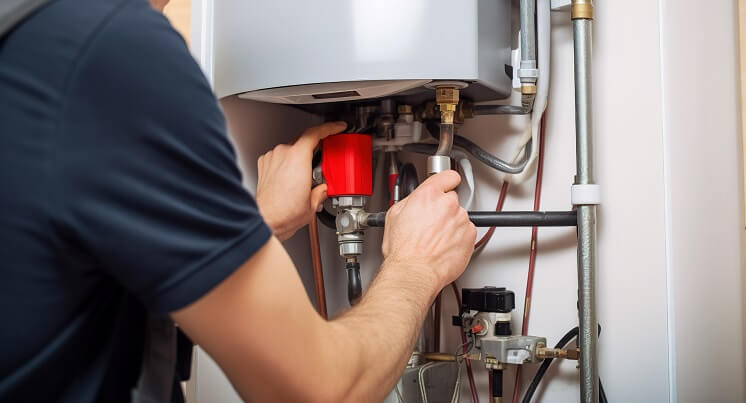Exploring Guide To Common Problems
Exploring Guide To Common Problems
Blog Article
In this article in the next paragraph you will find additional decent insights concerning Water Heaters Problems.

Think of starting your day without your routine warm shower. That already sets a poor tone for the rest of your day.
Every residence requires a dependable hot water heater, but just a few know how to take care of one. One very easy way to maintain your water heater in top form is to check for mistakes consistently as well as repair them as soon as they show up.
Bear in mind to turn off your water heater before smelling around for mistakes. These are the water heater mistakes you are more than likely to encounter.
Water as well hot or also cold
Every water heater has a thermostat that figures out just how hot the water gets. If the water entering into your home is too warm despite establishing a hassle-free maximum temperature level, your thermostat may be damaged.
On the other hand, too cold water may result from a fallen short thermostat, a damaged circuit, or incorrect gas circulation. As an example, if you use a gas water heater with a broken pilot light, you would get cold water, even if the thermostat remains in best condition. For electrical heating systems, a blown fuse might be the culprit.
Inadequate warm water
Hot water heater come in many dimensions, depending on your warm water needs. If you lack hot water prior to everyone has had a bathroom, your hot water heater is also little for your family size. You ought to consider mounting a larger water heater storage tank or going with a tankless hot water heater, which occupies much less area and is more sturdy.
Unusual sounds
There are at the very least 5 kinds of sounds you can hear from a water heater, yet the most typical interpretation is that it's time for the water heater to retire.
First of all, you need to recognize with the typical sounds a hot water heater makes. An electrical heating system might seem different from a gas-powered one.
Standing out or banging noises generally mean there is a slab of debris in your tanks, as well as it's time to clean it out. On the other hand, whistling or hissing audios might simply be your valves allowing some stress off.
Water leakages
Leaks can come from pipelines, water connections, valves, or in the worst-case circumstance, the container itself. In time, water will certainly wear away the tank, and discover its way out. If this occurs, you need to replace your water heater as soon as possible.
However, prior to your change your entire storage tank, be sure that all pipelines are in area and that each shutoff works flawlessly. If you still need help recognizing a leakage, call your plumber.
Rust-colored water
Rust-colored water suggests one of your water heater elements is rusted. Maybe the anode rod, or the container itself. Your plumber will be able to determine which it is.
Warm water
Regardless of just how high you established the thermostat, you will not obtain any kind of warm water out of a heating system well past its prime. A water heater's performance might lower with time.
You will certainly also obtain lukewarm water if your pipelines have a cross link. This implies that when you activate a tap, hot water from the heater moves in together with routine, cold water. A cross connection is simple to area. If your warm water faucets still run after shutting the water heater valves, you have a cross connection.
Discoloured Water
Rust is a major source of filthy or discoloured water. Rust within the water tank or a failing anode pole can trigger this discolouration. The anode pole protects the storage tank from rusting on the inside and should be examined yearly. Without a pole or an appropriately functioning anode pole, the hot water promptly corrodes inside the tank. Call an expert water heater professional to figure out if changing the anode pole will repair the issue; if not, change your hot water heater.
Verdict
Preferably, your hot water heater can last one decade prior to you require an adjustment. Nonetheless, after the 10-year mark, you might experience any of these mistakes extra routinely. At this point, you ought to add a new hot water heater to your budget plan.
How To Troubleshoot 3 Common Water Heater Problems in Twin Cities
The Water Heater Is Leaking
A leaky cold water inlet valve A loose pipe fitting A leaky temperature and pressure relief valve A corroded anode rod A cracked tank Turn Off Your Water Heater:
Shut off your gas water heater by turning the gas valve on the unit to the “OFF” position. Shut off your electric water by switching its power off at your electrical panel. Look for a two-pole breaker labeled “water heater” and turn it to the “OFF” position. Move the ball valve connected to the water heater to be perpendicular to the piping at a 90° angle. Look for the Leak:
Depending on whether the water is coming from the tank's top or bottom, you’ll want to look for the leak in different locations.
If the leak comes from the top of the tank, carefully look for water escaping from the cold water inlet valve or loose pipe fittings. Rusted hot and cold water valves can have loose connections with the tank, with water leaking out of them.
https://mspplumbingheatingair.com/blog/how-to-troubleshoot-3-common-water-heater-problems
As a reader about Common Problems with Tank Water Heaters, I assumed sharing that piece of writing was a smart idea. Those who liked our blog post if you please remember to pass it around. Thanks so much for taking the time to read it.
Quick resolutions for plumbing disruptions. Report this page